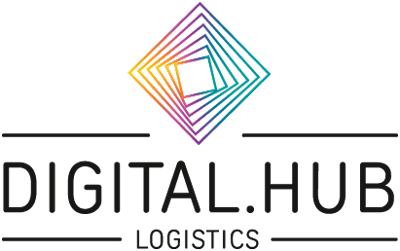
Unique ecosystem for the
digital transformation of Industries
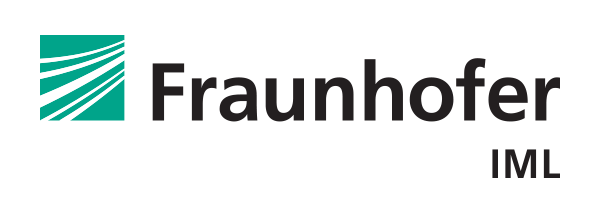
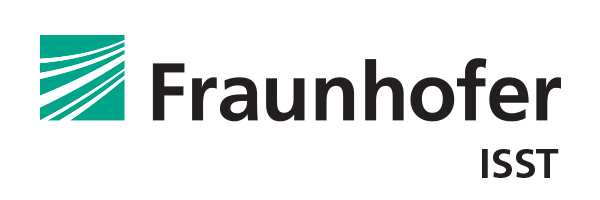

In recent years, the major scientific institutions in Dortmund have fostered numerous initiatives and projects in the field of logistics and digitization and with that creating the structures for sustainable innovation development in the high-tech logistics sector. The result is a unique ecosystem for the digital transformation of industries. The aim is to support the development and faster dissemination of innovative products and processes. An essential basis for the development of specific formats and services is networking.
Our formats and services
Research
Testbeds
Flagships
SME Enabler
Enterprise Labs
Start-up-Support and Entrepreneurship
Talents
Trigger For the future of Logistics
Networking with partners in European research projects but also in European technology platforms such as the Alliance for Innovation through Collaboration in Europe (ALICE), the European Factories of the Future Research Association (EFFRA) or the Big Data Value Association (BDVA) is an ongoing activity of all partners.

Competence Center
The Fraunhofer Institute for Material Flow and Logistics IML with its headquarter in Dortmund and branches in Frankfurt/Main and Hamburg, for example, works as a leading authority in applied logistics research in Germany and Europe in all fields of internal and external logistics. The researchers develop cross-industry and customer-specific solutions, for example, in the area of material flow technology, warehouse management, business process modeling, simulation-supported system planning, transport systems and resource logistics: this covers logistics research to 100 %. As one of the most important player in logistics research, Fraunhofer IML takes on responsibility in several well-established international committees and organizations.

Competence Center
The Fraunhofer Institute for Software and System Engineering ISST, based in Dortmund, is active in the fields of logistics, data management, automotive and healthcare as industry-oriented research institute. It supports its customers and partners in all issues related to digitization. The focus is on the use of data as a strategic resource in »data ecosystems«. The institute works as a neutral partner on direct behalf of industry but also on publicly funded projects of the EU and of government of the Federal Republic of Germany and its states. The range of services includes software engineering of new digital solutions, training, feasability and market studies as well as potential analyses.

Competence Center
With numerous scientific awards and prizes, more than 1,000 third-party funded projects, international cooperation and large associated projects, the TU Dortmund University is one of the most respected technical universities in Germany. The environment for successful research is characterized by four affiliated institutes from both the Fraunhofer-Gesellschaft and Leibniz-Gemeinschaft as well as a Max Planck Institute. As an award-winning start-up and entrepreneur university, TU Dortmund University supports the transfer into application. The neighboring Technology Park Dortmund is one of the largest and most successful in Europe.
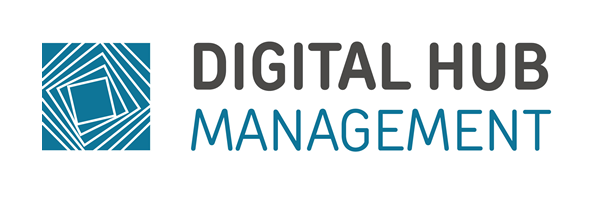
Competence Center
The Digital Hub Management GmbH (DHM) stands for the management of large business-driven innovation projects and initiatives in the context of industry 4.0 and digitization. The company is responsible for knowledge transfer, the management of networks and the development of communities. For example, DHM runs the offices of the Digital Hub Logistics, International Data Spaces Association IDSA, and the SME 4.0 Enabling Center »Mittelstand-Digital Zentrum Ruhr-OWL«.
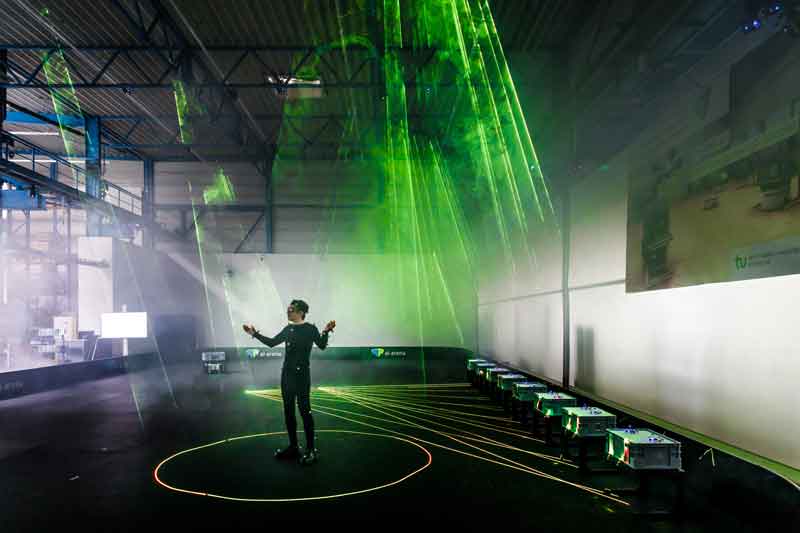
Research
Achieve more with joint research
Logistics research is still a relatively young discipline. Therefore, the extremely dense research and innovation infrastructure in Dortmund can be taken even less for granted. The unique ecosystem has developed significantly over the past ten years. The sciences’ demand that companies should invest one percent of their turnover in applied research also raised awareness on the part of industry of how significant research is for industry. The basics for this development have been laid by the scientific facilities of the Digital Hub Logistics – driven particularly by today‘s Competence Centers: Fraunhofer IML, Fraunhofer ISST and TU Dortmund University. As ambassadors of modern logistics research, the major scientific institutions in the relevant national and international networks, committees and organizations have not only promoted the establishment of logistics research – on an equal footing with disciplines such as mechanical engineering, electrical engineering or IT and software engineering – but have also set standards with their own research activities, both at the conceptual and technological level. With associated research publicly funded by the EU, the federal government and the federal states as well as contract research for industry, the scientific institutions of Digital Hub Logistics ecosystem now cover the entire innovation chain from basic research, pre-production and applied research up to prototype construction, pre-series maturity, product development and market uptake. The innovations developed will be used by participating companies throughout Germany and Europe. The research results from publicly funded projects are also available to other interested companies. At the same time, basically new collaboration formats became established with which gaps in research and transfer can be closed and future topics can be specifically addressed. Particularly remarkable is the constantly updated and direct transfer stream from research to teaching and application within the Digital Hub Logistics. Logistics research is now facing the next challenge: advanced digitization and thus artificial intelligence and its enablers like data sovereignty and smart data infrastructures, which all in all is changing everything for everyone. According to research, logistics will be the first industry in which platforms, blockchains, and AI processes will gain mass acceptance. The decisive course for the development, testing and validation of new technologies is currently being set in the Digital Hub Logistics.
Exemplary Research
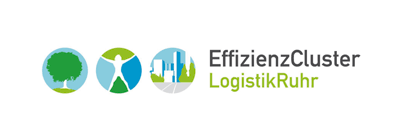
As the leading research and innovation cluster for logistics in Europe, the EffizienzCluster LogistikRuhr provides a platform for cooperation, innovation and infrastructure that supports companies in their competitiveness. The Federal Ministry of Education and Research (BMBF) funded the project with more than 40 million Euros.
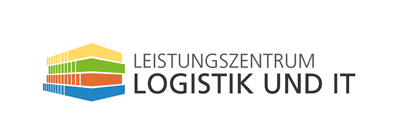
Under the umbrella of the Centre of Excellence for Logistics and IT, ten interdisciplinary research groups, the research clans, are further developing current research within a clear thematic context and setting up roadmaps for the future.
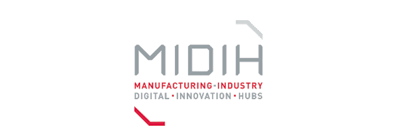
In the EU project »Manufacturing Industry Digital Innovation Hubs«, medium-sized companies in Europe are optimally prepared for industry 4.0 with support services and training opportunities.

The EU project DIH2 aims to share expertise on agile production and robotics challenges – including technology, investment, standardization, but also ethics, data and Internet safety – with SMEs.
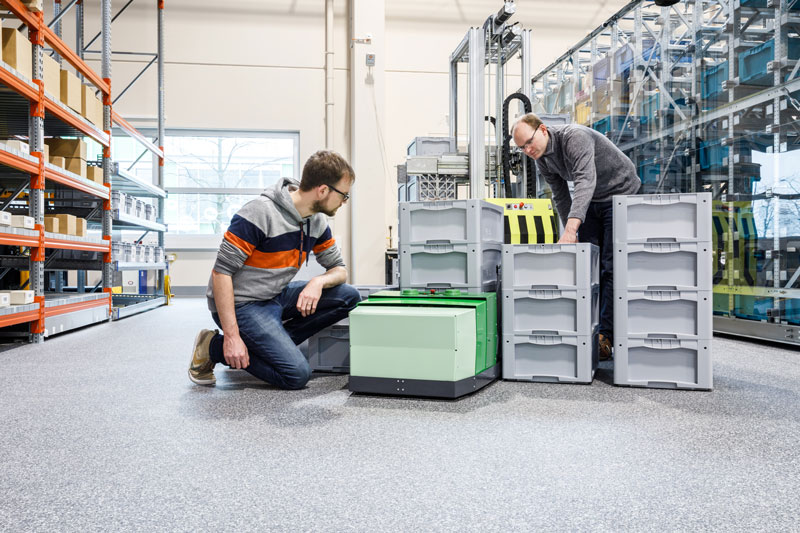
Flagships
Pioneer of digital innovations
Fundamentally, the Internet of Things and Industry 4.0 created new forms of services and the interaction between people and technology in a networked economy. The principle is networking. Data security and data sovereignty, briefly an intelligent data infrastructure, are an essential prerequisite for this. The flagships in the Digital Hub Logistics drive and control this development with a vision and long-term goals. Research and application go hand in hand. In recent years, numerous large initiatives and projects have been initiated and implemented within the Digital Hub Logistics` ecosystem. The goals and orientation of the flagships are quite different. However, the focus is usually on developing and testing new technologies, determining technology acceptance and the resulting findings on the design of products and services. At the same time, new standards are established through quickly implementable use cases and the broad participation and networking of companies. By involving a wide range of partners, the flagships also contribute to strengthening the location and deepening the cooperation between basic research, application-oriented research and technology development. The results are not only made available to the participating partners, but generally also benefit the general public. What the initiatives definitively have in common is that they contribute to covering the innovation chain – from basic research to market entry of products. Today, the lighthouse projects in Digital Hub Logistics are put on the same level with competencies along the entire logistics value chain. Through formats such as public events and up-to-date digital communication, the flagships ensure the transfer of knowledge and enter into dialogue with a wide variety of social groups. Last, but not least, the lighthouse projects strengthen the digital pioneering role of Dortmund and make research in the Digital Hub Logistics visible at national and international level.
Exemplary Flagships
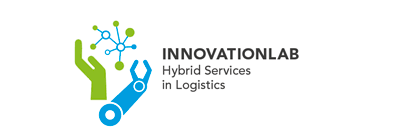
The Innovationlab Hybrid Services in Logistics is an interdisciplinary research project in which technological innovations are developed for a Social Networked Industry. The focus is on human-technology interaction. The Federal Ministry of Education and Research (BMBF) is funding the project with more than 10 million Euros.
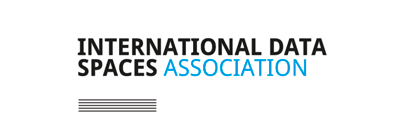
The International Data Spaces Association aims to guarantee data sovereignty by an open, vendor-independent architecture for a peer-to-peer network which provides usage control of data from all domains. More than 100 companies and institutions of various industries and sizes from 20 countries are members of the association.
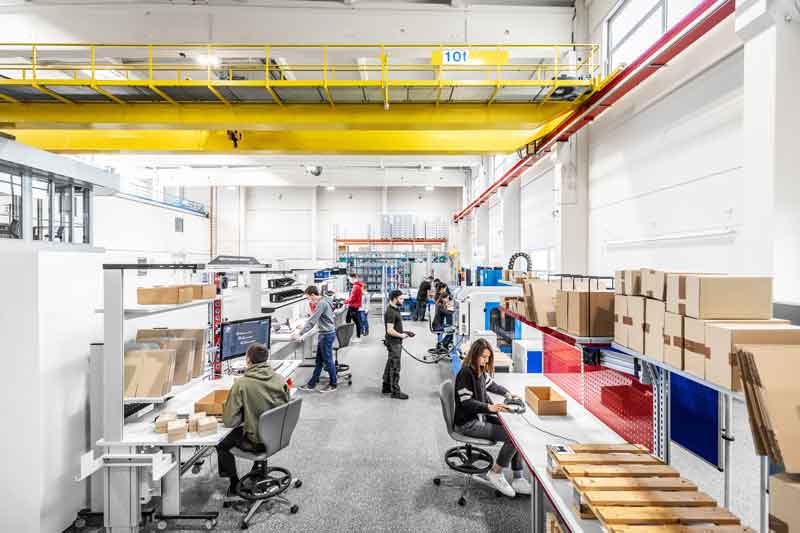
Testbeds
Create specific innovations
The research infrastructure at a science location creates the prerequisites for competitive leading edge research. In recent years, research and application centers as well as demonstration halls with ultra-modern equipment have been set up, particularly in the competence centers of the Digital Hub Logistics. Here, new technologies for the logistics future are tested, specific innovations are generated through applied research and put into practice by the participating companies. Anja Karliczek, Federal Minister of Education and Research, already described the test halls of the Digital Hub Logistics ecosystem as one of the »largest European research campus«.
A major focus of the research infrastructure is on the Internet of Things, on cyberphysical systems and data sovereignty and data ecosystems. More than 100 demonstrators in various testbeds provide the basis for the current industry 4.0 competence at the location. The research infrastructure therefore makes a significant contribution to the modernization of traditional industries. Topics such as artificial intelligence, blockchain and smart contracts are currently becoming increasingly important.
Many of the demonstrators and test systems are jointly operated by the competence centers and their partners. Representatives from science and industry involved via the hub‘s partners generally have access to the testbeds without red tape. There, they can operate, analyze and validate their own developments – often in a business context. This is particularly attractive for small and medium-sized enterprises.
International delegations, for example with representatives of European networks or industrial companies, regularly take the opportunity to get informed about the current state of logistics research and logistics during guided tours through the testbeds. Moreover, the test halls are again and again venue for congresses or conferences. The testbeds are also open to the public. Guided tours and events foster discourse on topics such as the new role of humans in industry 4.0 or the opportunities and risks of artificial intelligence.
Exemplary Testbeds
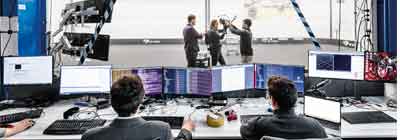
In the »Research Center Hybrid Services in Logistics« at TU Dortmund University, new methods and technologies are tested in experiments e. g. in the field of localization and wireless communication.
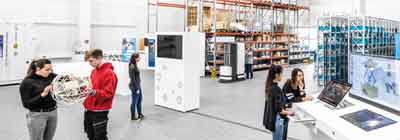
In the »Application Center Hybrid Services in Logistics« at Fraunhofer IML, new methods and technologies can be demonstrated realistically in a model environment.
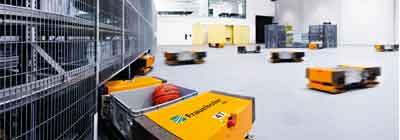
In the »LivingLab Cellular transport systems« at Fraunhofer IML, the largest experiment of artificial intelligence in intralogistics takes place.

The LEGAL TESTBED is a digital experimental field for automated business processes. It will place negotiations and contracts between machines on a legally secure basis.
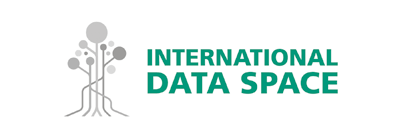
The International Data Space Lab at Fraunhofer ISST offers infrastructure for software development projects and collaboration on data sovereignty and IDS implementations.
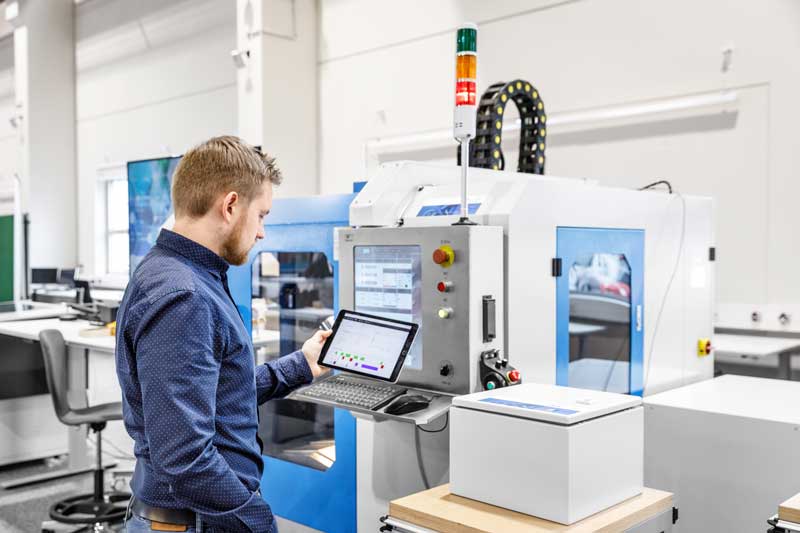
SME Enabler
A tandem innovation leap
Ever further, ever faster, ever higher: Digitization is changing the economy, business models and business processes. The time of long pre-runs is over. However, small and medium-sized enterprises (SMEs) in particular are still not exploiting the full potential of digitization. While large companies and corporate groups often have sufficient resources at their disposal to drive the digital transformation forward on their own, small and medium-sized enterprises first of all need offers for tailor-made consulting and skills qualification.
What does digitization in an industrial context mean? What is the benefit for my company? How can I implement digitization projects in my company? Who are the best partners? In the Digital Hub Logistics, companies at different maturity levels are supported in strengthening their competitiveness and developing new business fields in the context of digitization and Industry 4.0. With a multitude of service modules, the companies are accompanied in a targeted manner during the introduction of digital products and processes.
The principles of SME support in the Digital Hub Logistics include simple experimentation with new technologies, promoted cooperation with R&D partners and entry into cooperative research and development with manageable risk. Through consultancy services on the one hand and cooperation with research on the other, SMEs receive suggestions for rethinking their processes, discovering new products and incorporating their developments into their own planning. Thus innovation and technology leaps are made possible in a fast and uncomplicated way.
Particularly in cooperation projects with research, companies lay the foundation for their future implementation in their own companies or for innovative market services. The starting point is always the specific innovation requirement of a company, whereby the special requirements defined by its structure and size are always taken into account. I.e. companies are picked up where they stand technologically. Particularly in the area of digitization and industry 4.0, there is increasing research into »small« solutions that can be implemented quickly and easily. This lowers the inhibition threshold for SMEs into research on the one hand. On the other hand, companies can realize research results after project completion with comparatively little effort.
In addition, interested companies can also participate in the results of research projects in which they were not involved themselves. In particular, these are research results from the flagships (see page 7), which are made available to companies in transfer events such as workshops, etc.
With the support of so-called start-ins, the Digital Hub Logistics is locating a completely new form of SME support. Start-ins are independent digital units of classic, grown medium-sized companies. The Digital Hub Logistics provides them with suitable partners and support services for digital transformation.
Exemplary SME Enabler
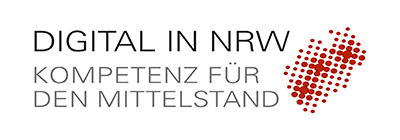
The SME Enabling Center »Digital in NRW« – part of the funding initiative »Mittelstand 4.0 – Digitale Produktions- und Arbeitsprozesse« (»SME 4.0 – Digital Production and Work Processes«) of the Federal Government – prepares the topics of digitization and networking specifically for small and medium-sized enterprises in North Rhine-Westphalia and submits specific offers to them for joint implementation. All support services are free for the enterprises.
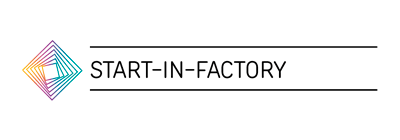
The Start-in-Factory of Digital Hub Logistics offers companies a variety of innovation modules with which they can accelerate digital transformation processes. The prerequisite for using the service is a paid membership.
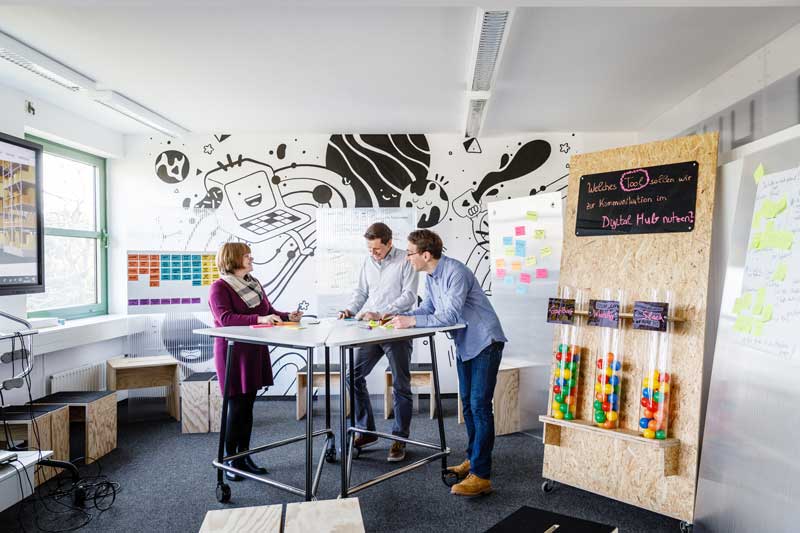
Start-up-Support And Entrepreneurship
A new innovation culture
Start-ups in the field of logistics are often very technology-oriented and have a high level of data and ICT competence. The Digital Hub Logistics contributed to establishing entrepreneurship as an important complement to research and transfer in Dortmund and to increasing the number of start-ups. In particular, the facilities at the hub support students and scientists in exploiting their innovative ideas and research results in start-ups and spin-offs. Start-ups are supported through all development stages from the genesis of ideas to the rollout of products. The experts of all institutions in the Digital Hub Logistics are available to them for the content-related and technical further development of their business ideas and their implementation, including the research infrastructure. This allows the founders to use the know-how and equipment of the organizations for their specific purposes. At the same time, they have access to a comprehensive coaching program. Moreover, the founders receive support in financing issues and in identifying potential investors. Lack of both market access and distribution channels are one of the biggest challenges faced by start-ups. The Digital Hub Logistics therefore brings the founders together with small and medium-sized enterprises (SMEs). In joint cooperation or pilot projects, start-ups can generate feedback loops and test phases as well as subsequent sales as a result. Moreover, the representatives from both worlds also exchange information in regular meetings and learn from each other. The Digital Hub Logistics, gives start-ups the opportunity to be included as practical partners in tenders for national and international research projects.
Exemplary Start-up-support

TU Dortmund University bundles its measures of research and qualification in entrepreneurship, the promotion of start-ups and young companies as well as knowledge and technology transfer in a central university institution – the »tu>startup – Centre for Entrepreneurship & Transfer«.
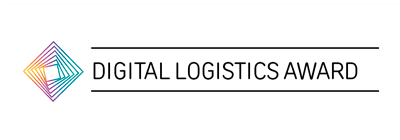
The Digital Logistics Award of the Digital Hub Logistics honors creative business solutions for the digital working world in logistics but also in production, trade, automotive, farm & food, mobility or the financial sector.

startport GmbH – a company of the duisport Group – is an innovation platform focusing on logistics and supply chain in the Port of Duisburg. startport supports start-ups in the development of innovative digital solutions.

The start-up competition start2grow, an initiative of the Economic Development Agency Dortmund, supports business start-ups nationwide in the development of their innovative business ideas with a unique network.
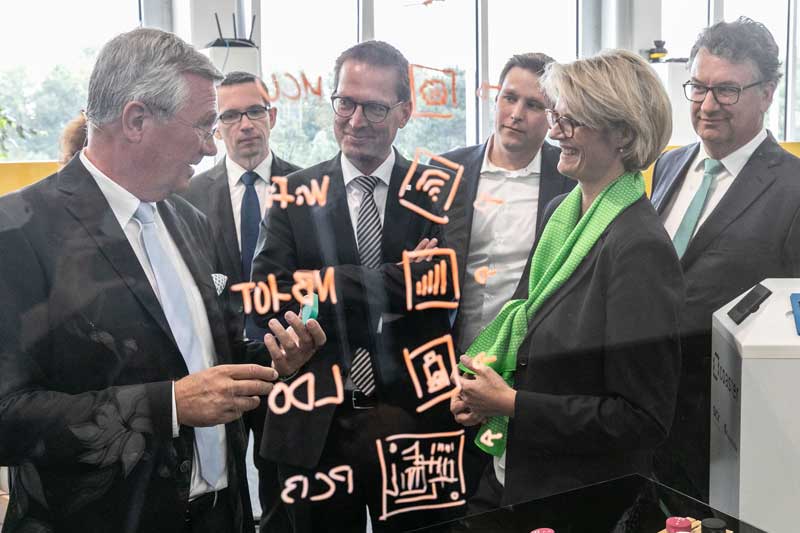
Enterprise Labs
Top speed research
Enterprise Labs are research and development partnerships between scientific institutions and large companies. The format was developed in Dortmund for medium-term and strategic cooperation with respect to cross-industry research by Fraunhofer IML. The basic idea is to translate research results into products or new business models at top speed. Through new and interdisciplinary forms of cooperative development without red tape, a high degree of transparency between industry and research is achieved. Direct participation in development processes enables companies to participate directly in the design of tomorrow‘s solutions. In the Enterprise Labs, researchers and company representatives work closely and actively together and implement innovations in direct cooperation. The focus is on the common path from topic identification to the market-ready business case. In addition to contemporary manufacturing technologies (e.g. 3D printing or SMD manufacturing), temporary workstations are provided in modern co-working areas. The symbiosis of theory and practice enables the implementation of ideas that are directly angled at the customer‘s business processes. Companies quickly gain practical insights into the technological maturity, applicability and willingness to implement new logistics products, services and business models. Another added value for the companies is the networking and cooperation between the Enterprise Labs. Apart from the lived bilateral exchange, an annual meeting of all labs takes place in which the participants inform each other about the orientation and current work in the respective lab. That triggers off new joint cooperations and projects.
Exemplary Enterprise Labs
- DACHSER Enterprise Lab
- DB Schenker Enterprise Lab for
- Logistics and Digitization
- EPAL Lab
- Keller & Kalmbach Future Lab
- Rhenus Enterprise Lab
- Sick AG Enterprise Lab
- Telekom Open IoT Labs
- Trade Finance Innovations Lab with the Commerzbank
- Würth Enterprise Lab
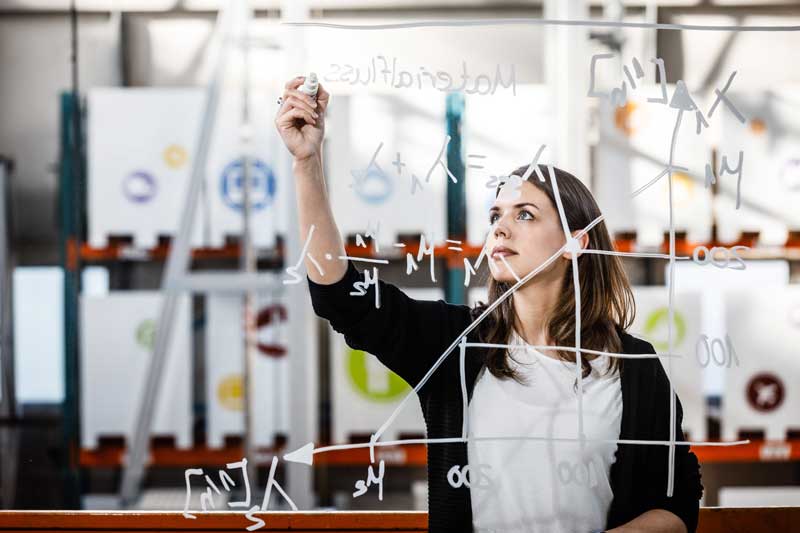
Talents
Ways into science
Well-trained researchers are in demand in both science and industry. The promotion of young scientists is therefore an important prerequisite for conducting top-level research and producing innovations. The Digital Hub Logistics also includes initiatives for the promotion of talents that advance scientific careers in the national and international environment, like the Graduate School of Logistics. In both publicly and privately funded doctoral programs, the interdisciplinary cooperation of young scientists on the basis of a committed methodological or terminological exchange between all participating disciplines has high priority. The aim is to work towards improving cooperation in practice in the medium term. Practical relevance also plays an important role. Therefore, research and practice are brought together in the Digital Hub Logistics. The support of the companies that are integrated into the innovation ecosystem, gives young scientists the opportunity to make direct contact with managers from industry in the context of excursions to companies, industry-meets-science workshops and live case studies. At the same time, the scientists have access to demonstration halls and test fields (see page 6) in the Digital Hub Logistics.
Exemplary Talents
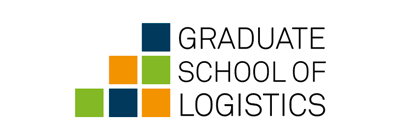
The Graduate School of Logistics (GSofLog) offers an industry-funded Phd program. The model is based on a unique concept throughout Germany.

The Research Training Group 2193 enables particularly qualified doctoral students from various disciplines to prepare their dissertations in the field of adaptation planning of factory systems.
